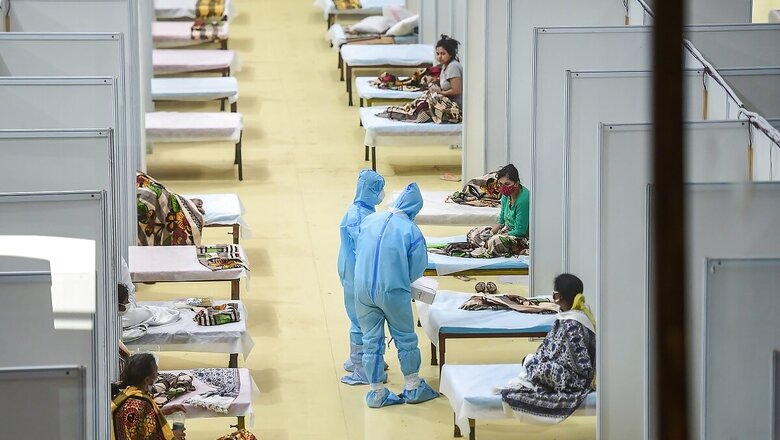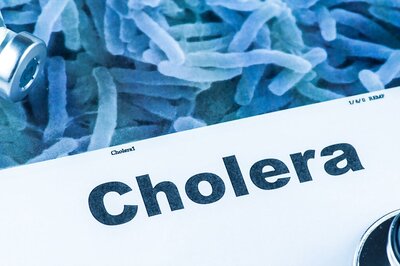
views
Ever since the coronavirus pandemic broke out last year, experts have been making special mentions for people with comorbidities asking them to take extra precautions. People with comorbidities include, diabetics, patients of heart diseases and hypertension and other similar health conditions. As the second wave rages across India, Indian Council of Medical Research answers some of the common questions regarding comorbidities and Covid-19 infection.
Here are some of the questions.
[strong]Are patients with heart disease, diabetes or hypertension at increased risk to get coronavirus infection?[/strong]
No, people with hypertension, diabetes or heart diseases are not at greater risk of contracting infection.
Among people with above diseases is there an increased risk of severe illness or complications once infected?
The majority (80%) of people diagnosed with COVID-19 will have mild symptoms of a respiratory infection (fever, sore throat, cough) and make full recovery. Some of the people with diabetes, hypertension and heart diseases, including Heart Failure (weak heart), may develop more severe symptoms and complications. Therefore, extra care is advised for these patients.
Are people with diabetes more prone to Covid-19 ?
In general, you know that people with uncontrolled diabetes are at increased risk of all infections. People with diabetes are not at higher risk for acquiring the infection, but some individuals are prone to more severe disease and poorer outcomes once infected. Hence, follow your diet and exercise routine (to the extent possible), take your medications regularly and test your sugar levels frequently so as to keep your diabetes under control.
When diabetic patients become sick, they may require frequent monitoring of blood glucose and adjustment of drugs including insulin, small frequent meals and adequate fluids.
For those suffering diabetes, hypertension and heart diseases, experts advise to take medicines medicines regularly, ensure all medications prescribed regularly as before even if you are mildly symptomatic. Don’t stop any medication unless advised by your doctor, continue with your blood pressure, diabetes and heart disease medications in case you are unable to visit your doctor,medications to control cholesterol (statins) should be continued.
What about reports about BP medications increasing severity of COVID-19 ?
After review of available information the consensus of various scientific societies and expert group of cardiologists is that currently there is no evidence that the two group of drugs- ACE inhibitors (eg. Ramipril, Enalapril and so on ) and angiotensin receptor blockers (ARBs) (eg. Losartan, Telmisartan and so on) increase the susceptibility or severity of COVID-19. These drugs are very effective for heart failure by supporting your heart function, and controlling high blood pressure. It maybe be harmful to stop these medications by yourself. This can worsen your heart condition.
What to take for pain or fever?
Some type of pain killers (called NSAIDs) like Ibuprofen is found to worsen the COVID-19. Such drugs are known to be harmful to heart failure patients and may increase your risk of kidney damage. Avoid NSAIDs or take them only when prescribed by your doctor. Paracetamol is one of the safest pain killers to use if needed. Control blood pressure (BP), blood sugar and do regular physical activity It is also important to control your risk factor levels – Avoid smoking and alcohol, have your BP and blood sugar levels under control and have some form of regular physical activity (However, please modify your out-door activities according to the norms of social-distancing.).
What to do in case of symptoms suggestive of COVID-19?
a. If you have symptoms suggestive of COVID-19, call your doctor and seek advice on the phone.
b. Contact nearby COVID-19 testing laboratories and arrange for testing.
c. While awaiting test results, stay at home and avoid close contact with family members, maintain hand hygiene, and correctly wear a medical mask.
d. If you test positive for COVID-19, isolate yourself at home as per the guidelines issued by Ministry of Health and Family welfare, India ( RevisedHomeIsolationGuidelines.pdf (mohfw.gov.in) ).
e. If there is worsening of your symptoms, contact your doctor for further advice
What should you do to prevent COVID- 19?
Covid-19 is spread by coughs and sneezes, through what are called droplets ( tiny amount saliva or other secretions expressed through cough/sneezing or even after a hearty laugh) and through touch . When you touch an object that has the virus particles on it, the virus may
get onto your hands and when you touch your face, you may get infected. Virus particles can persist upto 3 days and therefore it is important to maintain hygiene of your surroundings. Wash the rooms , tables and other surfaces with floor cleaners or even simple soap solution and sanitize your hands with hand sanitizers or by washing when you touch unknown or suspicious surfaces.
What are the important steps you can do to prevent acquiring or spreading infection?
1. Wear a mask – most important for protection of healthy people and to prevent transmission
a. Wear a medical mask in crowded areas and in poorly ventilated rooms. Make it a routine part of being around other people
b. The mask should cover your nose, mouth and chin
c. Avoid touching the mask frequently
d. Maintain physical distance of at least 1 metre even while wearing a mask
e. Wear a mask if a visitor comes to your home who is not a member of your household
f. Clean your hands before and after using a mask, and before touching it while still in use
g. Change the mask if it is soiled or wet, and dispose it properly in a trash bin
2. Social distancing.
a. Avoid contact with someone who shows symptoms of possible COVID-19 – anyone having a cold or cough or fever.
b. Avoid non-essential travel and use of public transport.
c. Avoid public places, crowds and large family get-togethers. Keep in touch with friends and relatives using phone, internet, and social media.
d. Avoid routine visits to hospitals/Labs.
Read all the Latest News, Breaking News and Coronavirus News here. Follow us on Facebook, Twitter and Telegram.

















Comments
0 comment